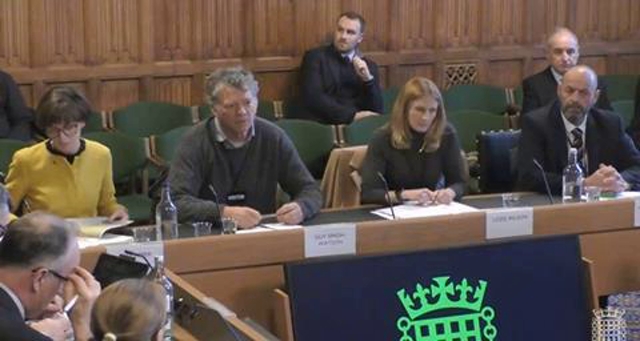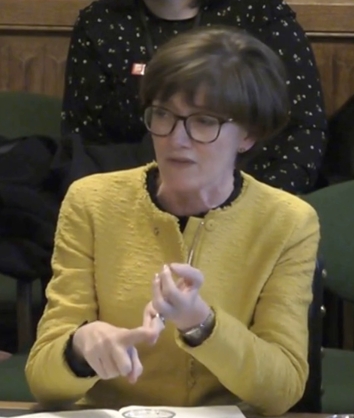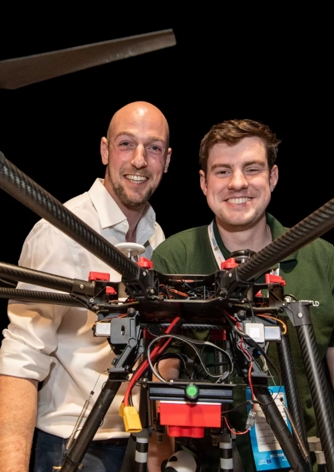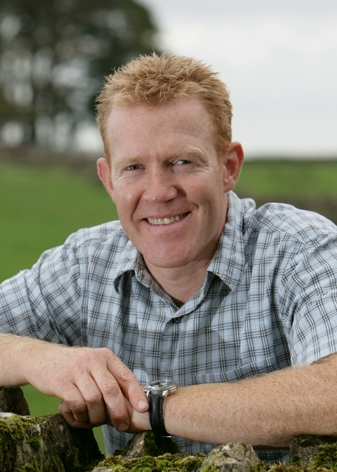

On Tuesday, The English Apple Man watched the live broadcast on BBC Parliamentary TV programme where leading members of the farming community were questioned by EFRA about the unfair practices by Supermarkets.
The Environment, Food and Rural Affairs Committee (EFRA) is appointed by the House of Commons to examine the expenditure, administration and policy of the Department for Environment, Food and Rural Affairs (Defra) and its associated public bodies.
Below: Ali Capper, Guy Singh-Watson, Mrs Lizzie Wilson and Michael Oakes
 Ali Capper - Executive Chair at British Apples and Pears Ltd
Ali Capper - Executive Chair at British Apples and Pears Ltd
Guy Singh-Watson - Founder at Riverford Organic Farmers
Mrs Lizzie Wilson - Chief Executive at National Pig Association (NPA)
Michael Oakes - Dairy Board Chair at National Farmers Union
I had rarely watched Parliament TV, and never seen a live Select Committee event.
Quite apart from the serious nature and importance of the subject, I found the expertise and eloquence of the panel fascinating.
The session underlined how farming in general, is facing deep unfairness trading with our UK Supermarkets.
While Ali Capper is an industry colleague and friend, I had never heard Guy Singh-Watson speak on a public platform before. The business that he created, Riverford Organic Farmers does not deal with Supermarkets and he is able to argue on behalf of primary producers without the fear so many suppliers face!
Mrs Lizzie Wilson outlined the Unfairness faced by pig producers; the reduction of slaughterhouses compounding the difficulties facing pig farmers. Michael Oakes demonstrated the the shambolic world of 'aligned milk contracts' facing dairy farmers.
BAPL provides strong evidence and clear call for action to EFRA Committee
On Tuesday 9th January 2024, executive chair of BAPL, Ali Capper gave evidence to the EFRA (Environment, Food and Rural Affairs) Committee on Fairness in the Food Supply Chain
Ali reminded the committee that over the last two years, growers have faced a 30% increase in the cost of production. At the same time, returns to farmers have averaged just 8%.
Fundamentally, there's a big gap between the increases in costs facing growers and what they are receiving back from supermarkets.
FAIRNESS!
Negotiating with supermarkets
Below: Ali Capper
 Ali provided insights into the annual contract negotiations between top fruit growers and the major supermarkets. She explained it's very difficult to go back into a retailer to negotiate for increases once a contract has been signed, yet top fruit growing faces short-term cost challenges and long-term investment decisions.
Ali provided insights into the annual contract negotiations between top fruit growers and the major supermarkets. She explained it's very difficult to go back into a retailer to negotiate for increases once a contract has been signed, yet top fruit growing faces short-term cost challenges and long-term investment decisions.
"Ordering apple and pear trees this year, they will arrive in two years, and they'll be in full production in six years." Ali Capper explained. "Given the current economic situation and the nature of supermarket contracts, you need a crystal ball to operate effectively in that kind of time frame.
"With supermarkets, you're talking about an annual negotiation. Almost all supermarkets will want a fixed price for the season - the whole 12 months. Most of the retailers used to come to us in June or July, when we knew what we had on the trees and there would be a negotiation.
"Now, half of the retailers are trying to negotiate in February, when we've got no idea what we've got. And the other half are pushing the negotiations into August or September. In the case of the start of season 2023, one retailer even pushed negotiations into the middle of October.
Most of the crop is harvested and in store by then.
FAIRNESS?
"Can you imagine the emotional stress to the farmer who has harvested his crop and still hasn't got a price agreed? You can see where the balance of power sits and it isn't with the grower."
Changing the cheap food policy
Ali clearly explained to the Committee: "We have a cheap food policy in this country and that policy is driving out British food producers. We have to start championing what we produce at home and accepting that it might not be the cheapest.
"We have to get real. We need to look at the climate change maps. The UK is in a good place to grow food going forward. Why are we not investing in that? Let's aim to grow food production in the UK by 30%."
Six recommendations for EFRA Select Committee
On behalf of BAPL, Ali Capper put six clear recommendations in front of the EFRA Select Committee:
To immediately write to the CEO of every major retailer to call for recognition of farm input inflation and fair pricing. In addition, the committee should demand long-term multi-year contracts between retailers and growers that enable farmers to make a profit and reinvest in their orchards and pack houses.
To impose the fair dealing clause from the Agricultural Act. The contract obligations around pricing mechanisms are particularly important. BAPL offered to help the government with a framework for each crop sector to ensure that the fair dealing clause works.
To remove the cap on seasonal workers and to make the Seasonal Workers Scheme a 5-year scheme.
To include commercial horticulture in the ETII (Energy and Trade Intensive Industries) scheme now to protect growers from future potential hikes in energy prices.
To ensure that future carbon border adjustments are developed to include food. This would mean that British growers are not competing with cheap imports with a much higher carbon and water footprint, while being targeted to reduce their footprints here.
To ensure that ELMs (Environmental Land Management) work with food production, not instead of it. For example, recognising the value to the environment of orchards and steps like planting wildflowers between rows of fruit trees.
FAIRNESS was mentioned several times, "we just want fairness"
-------------------------------------------------------------------------------------------------------------------------------------------------------
Trying to be positive
New developments in Artificial Intelligence are already changing farming practices, and British agriculture is at the forefront of innovation, says Countryfile presenter Adam Henson.
Mention AI to any self-respecting cattle breeder or livestock farmer and they will wax lyrical about the benefits of artificial insemination.
They'll talk about bloodlines, the quality of donor sperm and the importance of genetic diversity until the cows come home (literally). But increasingly, discussions on the farm are dominated by a different type of AI: artificial intelligence and how the enormous strides being made in technology are changing agriculture in a way that was unthinkable just a few years ago.
Below: Oli Hilbourne and Jim McDougal founders of Outfield - Drone Technology Below: Adam Henson

 Take drones, for instance. The first agricultural drone took to the air 23 years ago and they have become invaluable in monitoring and mapping fields from above to spot damaged crops and areas of weed or pest infestation. But soon, the technology will be so advanced there will be no need for a human operator, crops will be precision-sprayed automatically from the drone, and they'll be able to land unaided to allow an onboard robot to take a soil sample.
Take drones, for instance. The first agricultural drone took to the air 23 years ago and they have become invaluable in monitoring and mapping fields from above to spot damaged crops and areas of weed or pest infestation. But soon, the technology will be so advanced there will be no need for a human operator, crops will be precision-sprayed automatically from the drone, and they'll be able to land unaided to allow an onboard robot to take a soil sample.
Of course, many dairy farms are already high-tech locations, with robotic milking machines and GPS collars on every cow. Eventually, though, even that will seem old hat. At Harper Adams University in Shropshire they are developing AI systems that will cover the entire livestock enterprise.
I visited their trial farm and was amazed to see more than 70 cameras beneath the roof of the cattle shed with software that recognises individual cows and can log their behaviour, eating habits and milking efficiency to flag up signs of distress or illness.
Once the information from cameras, sensors and monitors is processed, analysed and synced with existing machinery, such as robotic fruit-pickers or weed-control lasers, anything is possible.
It won't be long before it's normal to run an entire farm from a phone. It's something the team at the Lincoln Institute for Agri-Food Technology have been talking about for several years and it's not as far-fetched as it sounds. I already get updates on my mobile phone during the key planting and harvesting seasons.
The English Apple Man Comments:
Drone technology has rapidly become integral to horticulture and farming. I remember first meeting Oli Hilbourne and Jim McDougall back in 2016.
By January 2019, Outfield was 100% focussed on fruit crops. This is when the Precision Orchard Dosing System (PODS) project began, a three year grant funded project with a large consortium of partners to use Outfield's aerial imagery techniques for precision spraying of blossom thinning agents in Orchard's
The exponential advance of new technologies, impacts on every sphere of our lives, I have no doubt Adam Henson's forecast of running his farm on his mobile phone will be realised sooner than he anticipates.
![]() That is all for this week
That is all for this week
Take care
The Englsh Apple Man